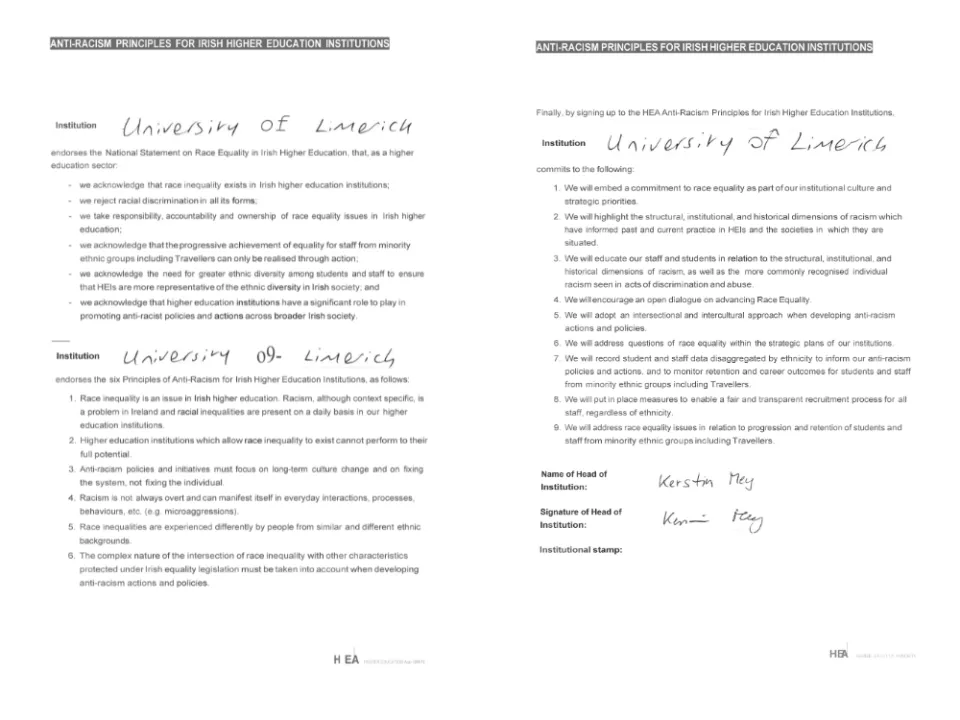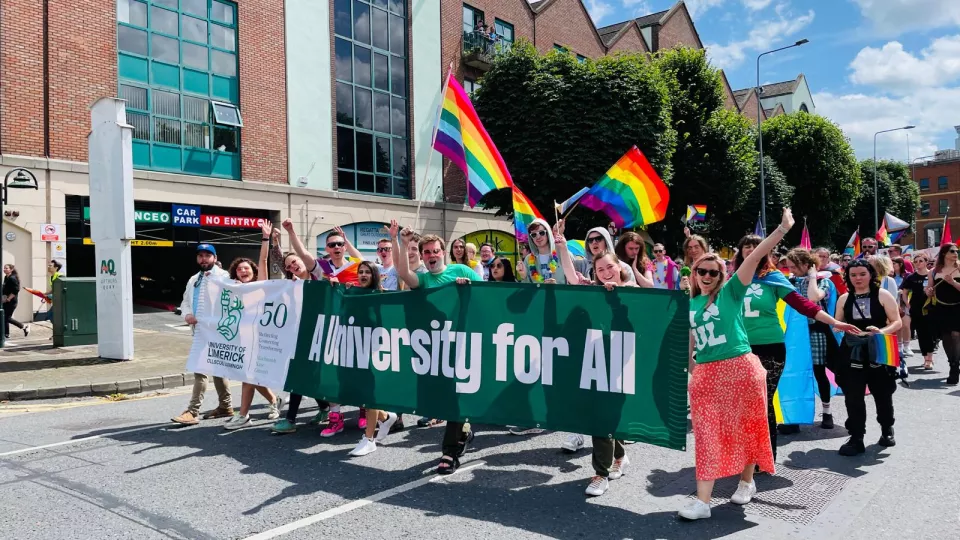Our commitment
We are unwavering in our commitment to celebrating diversity and fostering an environment where every member can thrive, regardless of their background.
UL is committed to the Higher Education Authority (HEA) Anti Racism Principles, launched on March 20, 2023, to encourage universities to lead societal change against racism.
On June 23, 2023, then-University of Limerick President Kerstin Mey publicly signed the principles, alongside HEA representatives, solidifying UL's commitment to combating race inequality.
Higher Education Authority report
October 2021 saw the publication of the report from the HEA survey on Race Equality in the Higher Education Sector.
The evidence gathered by the survey and the analysis and consideration of the issues raised in this report, along with the recommendations, provide a basis for universities to further develop policies and actions to address race inequality in higher education.
Read the report from the HEA survey on Race Equality in the Higher Education Sector.

ANTI-RACISM PRINCIPLES FOR IRISH HIGHER EDUCATION INSTITUTIONS
Institution University of Limerick endorses the National Statement on Race Equality in Irish Higher Education, that, as a higher education sector:
- we acknowledge that race inequality exists in Irish higher education institutions;
- we reject racial discrimination in all its forms;
- we take responsibility, accountability and ownership of race equality issues in Irish higher education;
- we acknowledge that the progressive achievement of equality for staff from minority ethnic groups including Travellers can only be realised through action;
- we acknowledge the need for greater ethnic diversity among students and staff to ensure that HEIs are more representative of the ethnic diversity in Irish society; and
- we acknowledge that higher education institutions have a significant role to play in promoting anti-racist policies and actions across broader Irish society.
Institution University of Limerick endorses the six Principles of Anti-Racism for Irish Higher Education Institutions, as follows:
- Race inequality is an issue in Irish higher education. Racism, although context specific, is a problem in Ireland and racial inequalities are present on a daily basis in our higher education institutions.
- Higher education institutions which allow race inequality to exist cannot perform to their full potential.
- Anti-racism policies and initiatives must focus on long-term culture change and on fixing the system, not fixing the individual.
- Racism is not always overt and can manifest itself in everyday interactions, processes, behaviours, etc. (e.g. microaggressions).
- Race inequalities are experienced differently by people from similar and different ethnic backgrounds.
- The complex nature of the intersection of race inequality with other characteristics protected under Irish equality legislation must be taken into account when developing anti-racism actions and policies.
Finally, by signing up to the HEA Anti-Racism Principles for Irish Higher Education Institutions,
Institution: University of Limerick
commits to the following:
- We will embed a commitment to race equality as part of our institutional culture and strategic priorities.
- We will highlight the structural, institutional, and historical dimensions of racism which have informed past and current practice in HEIs and the societies in which they are situated.
- We will educate our staff and students in relation to the structural, institutional, and historical dimensions of racism, as well as the more commonly recognised individual racism seen in acts of discrimination and abuse.
- We will encourage an open dialogue on advancing Race Equality.
- We will adopt an intersectional and intercultural approach when developing anti-racism actions and policies.
- We will address questions of race equality within the strategic plans of our institutions.
- We will record student and staff data disaggregated by ethnicity to inform our anti-racism policies and actions, and to monitor retention and career outcomes for students and staff from minority ethnic groups including Travellers.
- We will put in place measures to enable a fair and transparent recruitment process for all staff, regardless of ethnicity.
- We will address race equality issues in relation to progression and retention of students and staff from minority ethnic groups including Travellers.
Name of Head of Institution: Kerstin Mey
Signature of Head of Institution: Kerstin Mey
Institutional stamp:
HEA HIGHER EDUCATION AUTHORITY.
Race Equality
The Human Rights and EDI Office at UL is committed to dismantling racism whether at individual or institutional levels and promoting a culture of inclusivity and equity throughout UL.
The Office has developed a comprehensive Race Equality Action Plan that places the concerns of racialised students and staff at the heart of each action and policy, aiming to eliminate racial inequalities at the institutional level.

Age Friendly University
As part of our goal to become an egalitarian university, UL has established our Age Friendly University (UL-AFU) Committee to become an age-friendly university.
The mission of the UL-AFU is to create an inclusive culture, that values diversity, encourages the participation of older persons from both within and outside of the UL Community in the act of ‘knowledge creation and exchange’.

Gender identity and gender expression
University of Limerick supports trans staff and students through its Gender Identity and Gender Expression Policy.
Initiatives include inclusive training, gender-neutral facilities, and resources on pronouns and personal record updates.
Programs like ShoutOut training and awareness campaigns aim to foster equality and understanding.

EqUL
EqUL is our LGBTQIA+ staff network open to all staff interested in supporting and connecting with LGBTQIA+ staff and allies across the University.

Training and education
Our training programs are designed to foster an inclusive environment.
These trainings aim to empower the university community to embrace diversity and promote equality across campus.
Discover more about our diversity and inclusion training offerings
